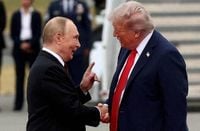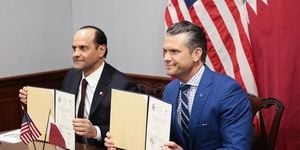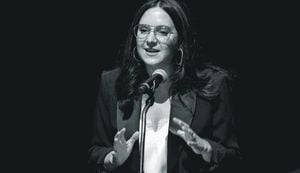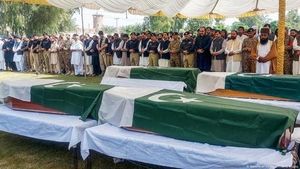Russian President Vladimir Putin’s sharp rebuke of the Nobel Peace Prize decision on October 10, 2025, sent ripples through diplomatic circles and social media alike, as he declared the prestigious award had lost its credibility. His remarks came just hours after the Norwegian Nobel Committee awarded the 2025 Nobel Peace Prize to Venezuelan opposition leader Maria Corina Machado—a choice that surprised many, not least because former U.S. President Donald Trump had openly lobbied for the honor. "There have been cases where the committee has awarded the Nobel Peace Prize to people who have done nothing for peace. ... In my view, these decisions have done enormous damage to the prestige of this prize," Putin told reporters during a visit to Tajikistan, according to the Kyiv Independent.
Putin’s comments weren’t just a critique of the Nobel Committee. He went on to lavish praise on Trump, saying, "(Trump) is truly doing a lot to resolve complex crises that have dragged on for years, even decades." The former U.S. president, not missing a beat, publicly thanked Putin on his social media platform Truth Social: "Thank you to President Putin!" he wrote, as reported by the Kyiv Independent and AP.
The exchange of compliments between the two leaders comes at a time when U.S.-brokered peace talks aimed at ending Russia’s full-scale war in Ukraine have nearly collapsed. Despite Trump’s campaign pledge to end the conflict within 24 hours, the months since his August summit with Putin in Alaska have brought only deadlier Russian attacks on Ukrainian cities and a hardened stance from the Kremlin. No ceasefire was achieved at the Alaska summit, and Trump’s promise to arrange a trilateral meeting with Putin and Ukrainian President Volodymyr Zelensky fizzled out, with no such talks ever taking place.
On October 8, Russian Deputy Foreign Minister Sergei Ryabkov captured the mood of disappointment, stating that momentum on the peace talks had been "largely exhausted." As reported by Reuters and the Ukrainian News agency, Ryabkov described U.S.-Russia relations as "a certain edifice… that has cracked and is collapsing." He also accused Ukraine’s European allies of "torpedoing peace efforts," further dampening hopes for a diplomatic breakthrough.
Yet, the Russian messaging has hardly been monolithic. Just days after Ryabkov’s gloomy assessment, Yuri Ushakov, an assistant to Putin, insisted that the efforts of Russia and the United States to end the war in Ukraine were ongoing and far from exhausted. "Claims that the Anchorage momentum is fading, or that the momentum has been exhausted, are completely incorrect. We continue to work with the Americans based on what was agreed upon between the presidents in Anchorage," Ushakov told Reuters. This divergence in tone—rare in Moscow’s tightly controlled hierarchy—underscores the complexity of Russia’s diplomatic strategy, which has oscillated between praise and warning since the Alaska summit.
According to a Kremlin aide quoted by Kommersant, Russia had offered concessions during the August summit, but these were contingent on Trump’s ability to negotiate with Ukraine and European leaders. The Anchorage meeting, held on August 15, 2025, was intended to persuade Trump to back a peace settlement in Ukraine favorable to Moscow and to foster a broader rapprochement between the U.S. and Russia. However, as Ryabkov noted on October 11, little progress has been made on either front, and the optimism that once surrounded the “spirit of Alaska” has faded.
Meanwhile, the situation on the ground in Ukraine has only worsened. Russia has continued to launch record-breaking drone and missile strikes against Ukrainian cities, ramping up attacks on energy infrastructure as winter approaches. President Zelensky, undeterred, said on October 8 that Ukraine would consider nominating Trump for the Nobel Peace Prize—if he manages to secure a ceasefire with Russia. It was a pointed, if somewhat ironic, nod to Trump’s unfulfilled promises and the complex geopolitics at play.
Trump himself has grown more publicly frustrated with Russia, even as he has shown interest in other international issues such as peace in Gaza. He has floated the idea of supplying Ukraine with Tomahawk cruise missiles, a move that has infuriated Putin. The Russian president warned that such actions would "destroy what is left of U.S.-Russia ties" and could require the direct involvement of U.S. military personnel. Andrei Kartapolov, head of the Russian parliament’s defense committee, went further, threatening that Moscow would "shoot down Tomahawk missiles and bomb their launch sites if the U.S. supplied them, and find a way to retaliate against Washington that hurts."
Despite these tensions, Putin has continued to praise Trump’s intentions for peace and even highlighted the humanitarian efforts of Melania Trump regarding Ukrainian children affected by the war. Melania Trump disclosed on October 10 that she has an open line of communication with Putin about repatriating Ukrainian children, and that some have already been returned to their families. Kirill Dmitriev, Putin’s presidential envoy, commended her "humanitarian leadership."
At a foreign policy conference in early October, Putin also made a series of U.S.-focused statements likely to appeal to Trump’s base, praising figures like Michael Gloss, the son of a CIA official killed in Ukraine fighting on Russia’s side, and condemning the murder of Trump ally Charlie Kirk. These remarks, as reported by Reuters and Russian media, seemed aimed at currying favor with Trump’s supporters even as official relations soured.
On the arms control front, Putin expressed hope for securing an agreement to extend a pivotal nuclear arms pact with Washington for another year, as reported by AP. He even offered to voluntarily maintain limits on deployed strategic nuclear weapons if the U.S. did the same, but so far, there has been no formal U.S. response.
Amid these diplomatic maneuvers, Russian officials have not shied away from issuing stern warnings. Ryabkov said Russia would respond decisively to any U.S. nuclear tests and is backing away from discussions on certain arms control agreements. He also indicated Russia would withdraw from an agreement with the U.S. to destroy weapons-grade plutonium, reflecting the deepening mistrust between the two countries.
The mood in Moscow, especially among pro-Kremlin commentators, has shifted from cautious optimism to disappointment. "After the summit in Alaska, there was hope that Trump was ready to continue dialogue with Russia and take our interests into account," wrote Andrei Baranov in Komsomolskaya Pravda. "Donald has now thoroughly disappointed us with his trademark inconsistency."
As of mid-October 2025, there are no plans for a new Trump-Putin meeting, and the U.S. has not sent a successor ambassador to Moscow since June. The diplomatic dance continues, but the steps are increasingly out of sync, leaving the prospects for peace—and for a Nobel Prize—hanging in the balance.




